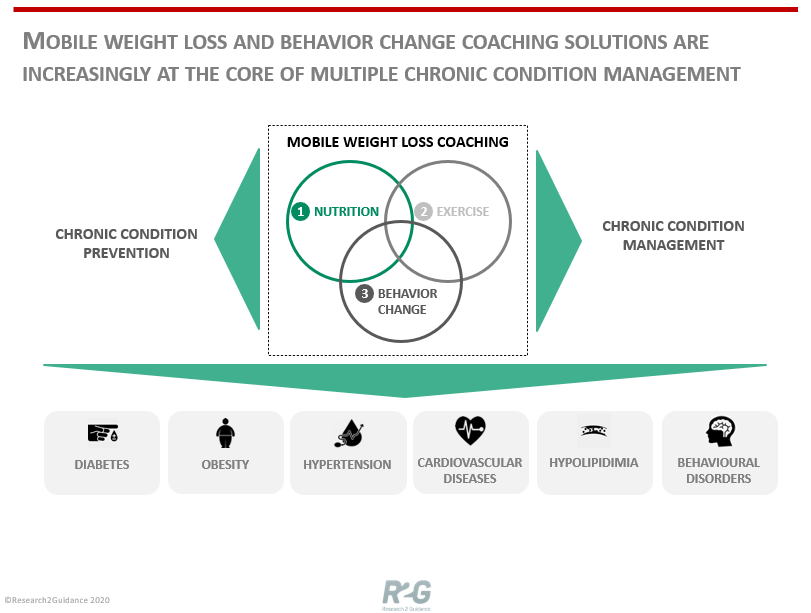Mobile weight loss and behavior change programs will shape the future of chronic care management
Mobile weight loss market is one of the biggest and most successful segments of digital health. Weight loss coaching programs, augmented by behavior change, are easily scalable and transferable, thus ensuring a successful expansion across various chronic conditions. Along with self-management, remote patient monitoring, and telehealth, behavior change coaching is shaping the emerging market for vertical chronic condition management.
With over 6,000 mobile solutions available, the mobile weight loss market is one of the biggest ecosystems in the digital healthcare. In the recent years mobile weight loss apps have revolutionized the weight loss market. The use of mobile apps has proven to be more efficient not only in comparison with on-site weight loss programs but also with other digital tools, such as web-based programs. Smartphone apps ensured a daily on-the-go usage of weight loss services, truly personalizing them and thus enhancing their efficiency. As a result, the mobile screen is increasingly becoming the major channel in the overall digital weight loss market.

Mobile weight loss programs specialize either on nutrition or physical exercises or leverage on the combination of the two. Yet quite often they prove to work only as a quick fix, without ensuring a long-lasting impact. As a result, there is an increasing importance of integrating the behavior change support as the third component of efficient weight loss programs, along with nutrition and fitness. In the context of weight loss, the behavior change approach helps establish long term exercise and nutrition patterns to avoid reverse trends.
Mobile weight loss solutions are booming in the end-user market, generating over USD 1.2 billion of annual revenue worldwide. Despite such an impressive market value, over two thirds of the amount are generated by only two market players: WW International and Noom. While being purely digital, Noom has also disrupted the commercial weight loss market with its behavior change approach and structured coaching program.
On the other hand, mobile weight loss coaching is increasingly popular in the payer market, especially in the chronic condition management. Since weight loss is relevant for a wide range of chronic conditions – such as diabetes, hypertension, cardiovascular diseases, and hyperlipidemia – it is quite easy to scale up weight loss coaching programs and apply them to various types of patients. As a result, vertical chronic condition management companies, such as Livongo and Omada, are thriving in the reimbursement market with their holistic approach to chronic care, largely based on weight loss.
Weight loss coaching programs are not equally developed across major chronic conditions. Prevention and management coaching have been historically strong in the diabetes management where they help Type 2 diabetes patients decrease the disease’s risks and challenges. Yet in other conditions, such as hypertension and/or cardiovascular diseases, the structured coaching programs were not widely available. Diabetes management companies – Omada, Livongo, Dario Health, Lark Health – turned out to be the most proactive in expanding their coaching approach over other conditions, which are also comorbidities of diabetes. While becoming a vertical chronic condition management companies, they have filled in gaps in other chronic conditions, scaling up their weight loss-focused solutions and augmenting them with behavioral health elements. As a result, weight loss and behavior change coaching programs are shaping the future vertical chronic care market, along with remote patient monitoring and telehealth solutions.
The mobile weight loss market has been affected by the Covid-19 crisis, like any other segment of digital healthcare. Yet quarantine and home confinement have demonstrated the importance of mobile weight loss solutions, which help patients remain in shape, manage their chronic conditions, and withstand mental health pressure regardless of self-isolation. This major shift is set to last even when the pandemic crisis is gone.
More information about mobile weight loss solutions you will find in our upcoming report The Global Mobile Weight Loss Market 2010 – 2025.





